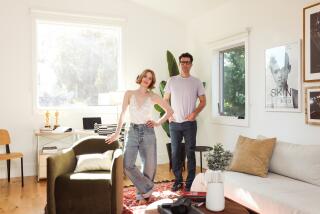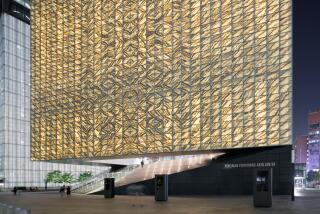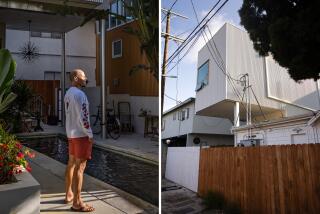THINGS TO COME : See You on the Holodeck
- Share via
Eight months ago, advertising guru Jay Chiat reopened the doors to his $16-million Venice headquarters, a Frank Gehry-designed building whose focal point is a three-story binocular-shaped entrance. Architects Lubowicki & Lanier had gutted the interior and designed an open plan with a clubhouse as a social center equipped with pool table, chessboard and punching bags bearing management’s faces. There’s a library, project rooms, lounge areas, even a concierge.
Sound like fun? Sure, except most of the employees can’t actually work there. The Chiat/Day office has gone virtual. Workers, if they need to come in, pick up their computers, phones and beepers at the “company store” as they arrive. They plug in their laptops at shared carrels or at other connections scattered around the building. But all in all, Chiat/Day execs would just as soon they stayed away.
There are certainly many benefits to freeing the worker from the office--less commuting time, family-friendly schedules, and telecommuting was a boon in the weeks following the Northridge earthquake.
But what’s it like to be on the compu-cutting edge? Management made it clear they wanted to “control” the coverage, but employees on their way in and out of the building were happy to talk (until a security guard came out with the message that Chiat/Day didn’t want employees interviewed).
Fun is part of the plan. Improving on IBM’s New Jersey virtual office, which consists mainly of a lot of anonymous cubicles, the Chiat/Day architects tried to make up for the loss of individual work spaces by creating recreational areas and furnishings that are playful. “They put kind of funky stuff in,” says one man, “like tilt-a-whirl things from a county fair, to put you in a different environment than in an office.”
Not everyone thinks the traditional office is so bad, though. “The paperless office is a little hard to handle,” one woman says--everything is now supposed to be filed electronically. “Everyone likes to keep paper, so you carry your papers, PowerBook computer on one shoulder, phone clipped on you, and everyone’s backpacks are getting bigger and bigger.”
Many employees grumble that the lack of a personal work space means no family photos or potted plants. “All you really own is a locker and an extension number,” says one staffer. “There’s no place to call home,” says another. “You just sort of roam.”
Then there’s the privacy issue. “You see people hiding off in corners, trying to make a private phone call,” says a woman employee.
Others refuse to sweat the small stuff. “For a younger associate, it might be like working in a vacuum,” says another staffer. “But it gives us the flexibility to work at our clients’ offices and gives us a lot more face time over there.
“And when I work at home,” he says, “I usually work longer. I get up, and instead of taking a shower and getting dressed, I immediately get to work. I live on the beach; I put my computer on the porch, I have my phone out there and I’m getting a suntan while I’m working.”
Of course, he admits, there’s a price for tan maintenance: “The closeness of the social interaction kind of goes away,” he says. So when he wants to chat at Chiat/Day, “I stop in. There’s a clubhouse with bagels and coffee in the morning, and popcorn and lemonade in the afternoon. It’s kind of fun, and I just read that we’re going to have a party the last Friday of every month.”
“Probably the most important step in a project like this is the desire to change,” says a technical administrator. “A few people left. They couldn’t adapt. Chiat’s genius is to see that change is really necessary. It stirs up the creative juices. People being upset is part of the whole process. People are going to get angry. You look at some of Picasso’s works, you think that he was always happy?”
Fortunately for those who get uptight by the creativity-through-stress ethic, massages are available twice a week. For those, you have to come in.






